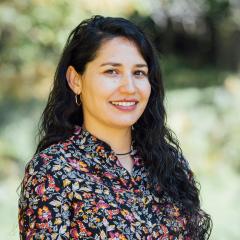About Alejandra's Work
As a young woman in diaspora and a mestiza, whose ancestors were both colonizers and colonized, my identity is shaped by multiplicity and the integration of varying truths. I was born in Colombia and migrated to the U.S. with my mother at age twelve. I had to learn a new language and set of social norms to fully participate in my new society, while still embracing my home culture. A remarkable difference I experienced living in the U.S. was the omnipresence of fast-food restaurants, a rarity for me growing up in Colombia. After many years in the U.S., I have visited family back in Colombia and noticed that these same fast-food restaurants are appearing one after the other, alongside an industrialized mode of food production. I realized that the homogenization of our global food system is not only changing the face of the earth, impacting our relationship to food, but also resulting in the loss of biocultural diversity and important, land-based knowledges. This observation has sparked my work in agroecology, my collaborations with the Embera de Chigorodó, an Indigenous community in Colombia, and has led me to become the first in my family to pursue graduate school. My current focus is to braid Indigenous ways of knowing, agroecology, and ecological economics to help mitigate the planetary crisis of pollinator decline and work towards a shared goal of global sustainability.

